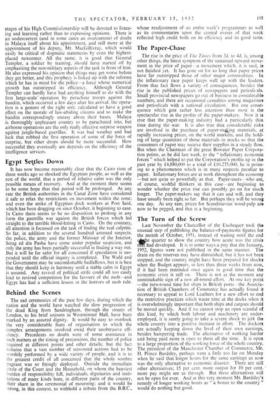The Turn of the Screw
Last November the Chancellor of the Exchequer took the unusual step of publishing the balance-of-payments figures for the month of October, 1951, instead of waiting until the end e quarter to show the country how acute was the crisis t ha d developed. It is in sonic ways a pity that the January, 1952, figures were not published in the same manner. The drain on the reserves may have diminished, but it has not been stopped, and the country might have been prepared for shocks when the Budget appears, in less than three weeks from now, if it had been reminded once again in good time that the economic crisis is still on. There is not at the moment any unmistakable sign of a new all-round effort. At one key point —the turn-round time for ships in British ports—the Associa- tion of British Chambers of Commerce has actually found it necessary to appeal to Lord Leathers for a new effort to end the restrictive practices which waste time at the docks when it is overwhelmingly important that both ships and cargoes should be moved quickly. And if we cannot stop an open scandal of this kind, by which both labour and machinery are under- employed, it is surely going to take a severe shock to jerk the whole country into a positive increase in effort. The dockers are actually keeping down the level of their own earnings, besides hampering trade. The alternative of working harder and being paid more is open to them all the time. It is open to a large proportion of the working force of the whole country. The president of the Manchester Chamber of Commerce, Mr. H. Prince Bardsley, perhaps went a little too far on Monday when he said that longer hours for the same earnings as now was the only alternative to economic disaster. There are still other alternatives; 15 per cent. more output for 10 per cent. more pay might see us through. But these alternatives will not be open for ever. And at this very moment Mr. Bardsley's remedy of longer working hours as " a bonus to the country " would do nothing but good.


























 Previous page
Previous page